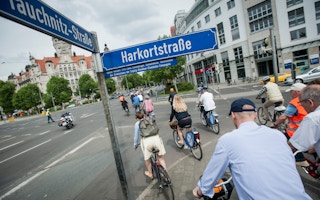Ministers across the world have called for a “significant decarbonisation” of the global transport sector so that greenhouse gas emission targets can be met. They also urged for more international co-operation to create transport systems that respond to the changing needs of citizens.
To continue reading, subscribe to Eco‑Business.
There's something for everyone. We offer a range of subscription plans.
- Access our stories and receive our Insights Weekly newsletter with the free EB Member plan.
- Unlock unlimited access to our content and archive with EB Circle.
- Publish your content with EB Premium.
In a declaration made at the recently-held International Transport Forum in Leipzig, Germany, transport ministers from 54 member countries called for policymakers to develop “an integrated package of transport and fiscal measures” to improve existing transport systems, and to support alternative transport ideas such as hydrogen or electric cars, walking and cycling.
Not only would such measures bring about an urgently needed reduction in global greenhouse gas emissions, they would also yield “strong co-benefits” such as enhanced health, improved road safety, economic growth and increased social equality, said the ministers.
But a major shift towards alternative transport technologies, public transport, walking and cycling can only be possible if planners and policymakers radically changed the way they think about transport and climate change, said experts at the three-day summit.
Read the rest of this feature in our inaugural Eco-Business magazine here.










